
Chihiro Nakamoto
Aarhus University, Denmark
Interview
〔Biography〕
2011 National Institute of Technology, Okinawa College (Dept of Bioresources Engineering)
2013 Master of Biomedical Science, Niigata University Graduate School of Medical and Dental Sciences
2017 PhD, Niigata University Graduate School of Medical and Dental Sciences
2017-19 Postdoc, Brain Research Institute, Niigata University
2019- Postdoc, Aarhus University, Denmark
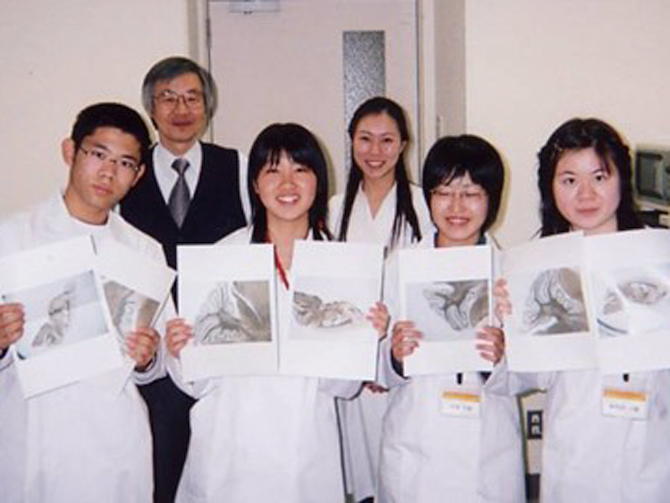
At the Science Camp (Prof Sakimura, second from the left; myself, second from the right).
What research did you do when you were at BRI?
I have studied mainly molecular biology, biochemistry, and behavioral analysis at BRI Professor Kenji
Sakimura's laboratory for eight years, including my master's, PhD and postdoc.
My research focused on three
main areas:
1 - Analysis of glutamate receptor delta type 1 subunit (GluD1)-deficient mice revealed the
interesting result that GluD1 deficiency enhances depressive-like behavior, and that this enhancement is
reversed by serotonin reuptake inhibitors.
2 - The delta glutamate receptor has two subunits, whose
distribution and subcellular localization in the brain were unknown. Therefore, a unique protein
quantification method using chimeric proteins was used to elucidate the quantitative relationship between the
two.
3 - I was involved in the creation of several types of genetically engineered mice and rats, including
GluD1-deficient mice, and learned the basics of molecular biology and developmental engineering in addition to
analyzing gene function with these animals.
In the Sakimura lab, many people supported me not only in
my research ideas and experimental methods, but also in my growth as a person. I would like to take this
opportunity to express gratitude.
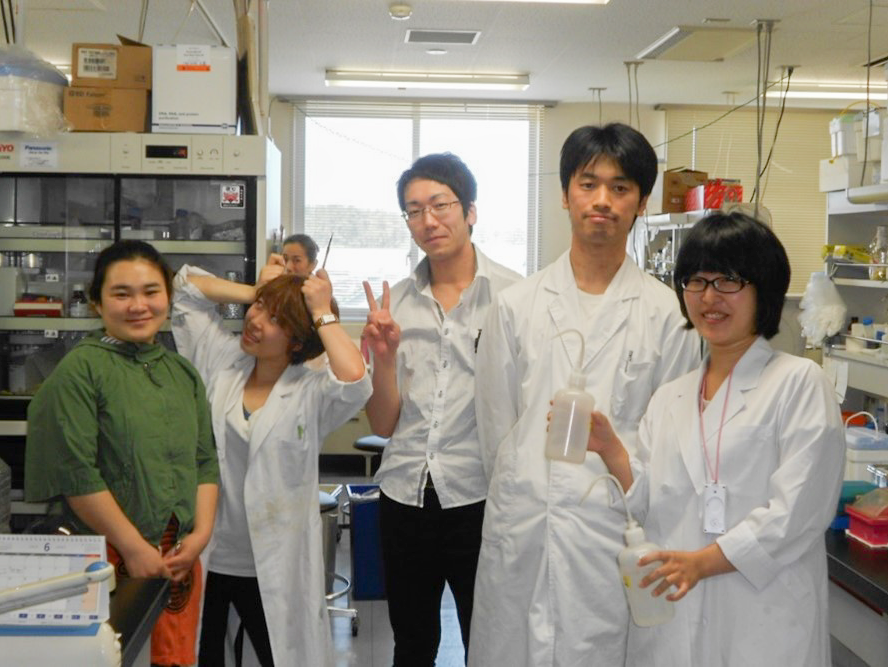
My graduate student days at the Sakimura lab.
When did you meet BRI?
I first came across BRI when I was 18 and participated in the Science Camp. The Science Camp was a 4-day program for high school and technical college students to select their field of interest from a variety of research institutes and experience hands-on research activity. I was interested in brain research and applied for the program at BRI. During the camp, we had a firsthand opportunity to look at the human brain and carried out behavioral experiments using mice as model animal, and learned methods for analyzing brain functions, including genetic analysis methods. I got to hold admiration for scientists and had an aspiration to become a brain scientist for the first time. When I was later making my choice for the master's program, I applied to Niigata University Graduate School of Medical and Dental Sciences and joined the Sakimura lab, where I had spent the Science Camp.
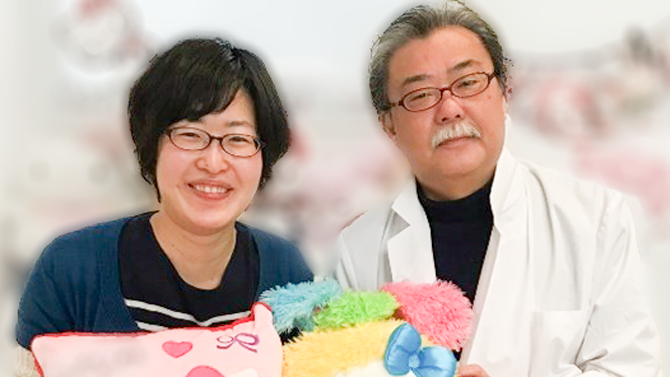
My last day at BRI with Dr Takei, who was in the lab next to mine.
Tell us about your current research.
In the Takeuchi lab, I've been trying to clarify the dynamics and molecular mechanisms of dopamine release from the locus coeruleus to the hippocampus during novelty. First, we developed a novel fluorescence dopamine biosensor to visualize dopamine (Nakamoto et al., Molecular Brain, 2021). We are currently combining such a fluorescence dopamine biosensor with fiber photometry technique in the brain so as to investigate the dynamics of dopamine release from the locus coeruleus to the hippocampus during novelty experience. In order to thoroughly investigate the dynamics of dopamine release from the locus coeruleus to the hippocampus, we are preparing hippocampal slice samples expressing fluorescence dopamine biosensors and attempting to activate the axons of the locus coeruleus optogenetically for observation with two-photon microscopy. We are working hard on the research everyday trying to advance our understanding of the neural circuits and molecular mechanisms of everyday memory and knowledge storage, which we believe will lead to the treatment of age-associated memory impairment.
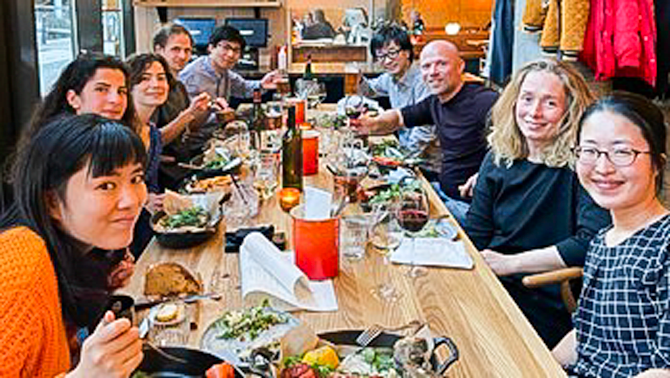
Farewell dinner party at the Takeuchi lab.
What made you start working on that research?
It is well known that everyday memory, such as "what and where I ate for dinner", is formed in a brain area called the hippocampus; and the memory is substantially forgetting within a day. However, unexpected/novel experience, such as "I ran into someone I liked from school on my way to dinner", could enhance memory retention (long-term memory). My current lab leader, Dr. Tomonori Takeuchi and his colleagues discovered that novel experience trigger the release of dopamine from the brain area called "locus coeruleus" to the hippocampus, forming long-term memory from everyday memory that would normally be forgotten. Dopamine release from noradrenergic neurons in locus coeruleus to the hippocampus, however, is a completely novel mechanism of neuromodulator release in the brain, and the kinetics and molecular mechanisms of this release are unknown.
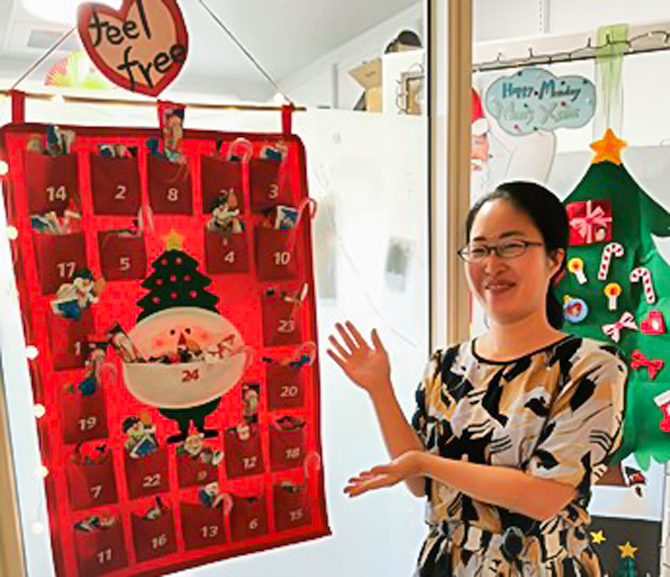
At the office -the lab door with Christmas display at DANDRITE.
What is your future plan?
I would like to learn data analysis, including programming, for optimal image processing and data analysis in in vivo imaging and microscopic imaging. I would also like to be spontaneous to be able to collaborate with experts in fast-evolving scientific technologies, such as biosensors and opsins. In the future, I hope to become an independent researcher who elucidates the mechanism of memory formation at the neural circuit and molecular level by monitoring neural activity in the brain through photometry and imaging in addition to behavioral analysis of animals. I hope to publish my research findings and contribute to the scientific community in Japan and around the world.
While it is indeed important to publish papers and obtain research funding, I also realize the importance of communication skills in order to work together as a team with people from different backgrounds. As spending time as a researcher in Denmark, I have many opportunities to be involved in supervising students and assisting classes, which led me to think more about teaching and supervision. It is very fortunate that Aarhus University offers a wide variety of workshops in English, including a pedagogical course, supervision, leadership, research funding, and CV writing. I will keep committing myself to my work, making the most of such opportunities presented in front of me along with building up experience while living abroad.





